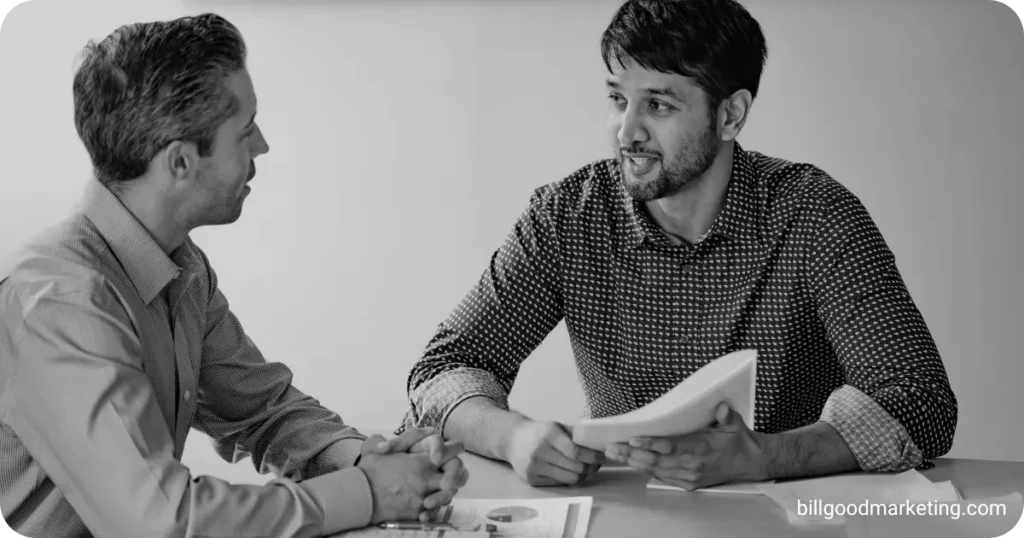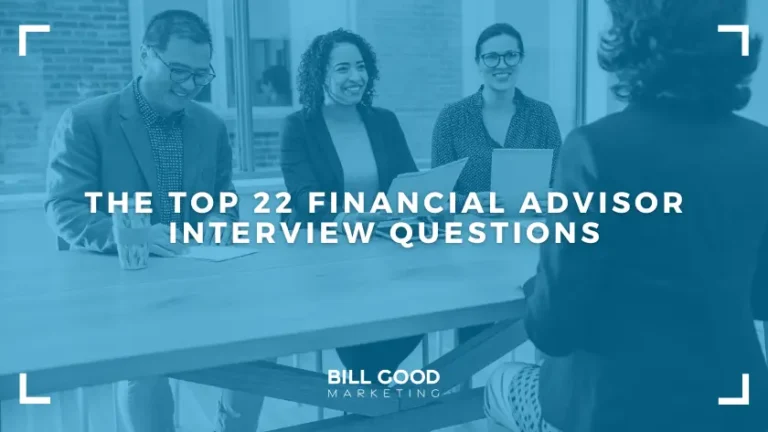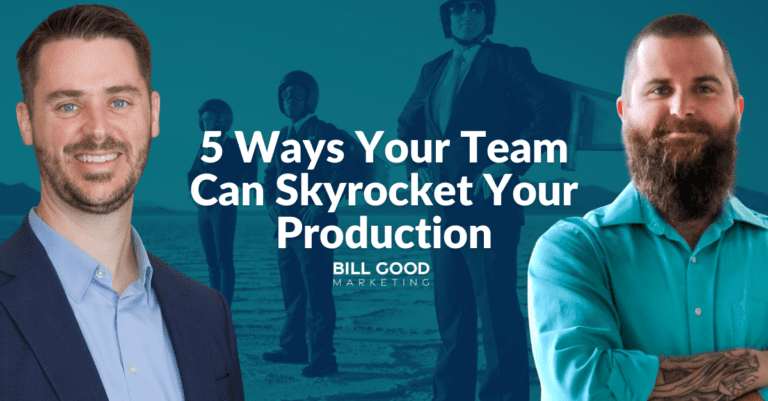Stepping into an interview—whether it’s your first job as a brand new financial advisor or you are transitioning to a new firm—isn’t just about answering questions. It’s about proving you’re the advisor they can’t afford to pass up.
Maybe you’re a seasoned professional looking for a fresh start at a firm with values that align with yours. Or perhaps you’re breaking into the industry, eager to show how your skills in financial planning, investment management, or even interpersonal communication will win clients and drive results.
Either way, the stakes are high. Changing firms means showcasing not only your ability to manage client relationships but also your adaptability to market trends, new tools like AI-driven, financial planning software, and the unique culture of the team you’re joining. Starting your first job means proving you have the problem-solving skills and potential to grow into a trusted expert.
The good news? You don’t have to figure it out alone.
This guide will help you master the Top 22 Financial Advisor Interview Questions—complete with insights into what interviewers are really looking for and how to craft answers that highlight your expertise in areas like risk management, retirement planning, and building diversified portfolios.
Because whether you’re navigating a career shift or making your debut, this is your moment to stand out. To demonstrate that you’re more than just a candidate—you’re the right choice.

Why Interview Prep Matters for Financial Advisors
An interview isn’t just a conversation; it’s a performance. The recruiter across the table isn’t just listening to what you say—they’re envisioning you as the advisor their clients will trust with their financial goals, retirement accounts, and investment decisions.
Every question is an opportunity to prove you’re not just qualified but exceptional.
- Do you understand the nuances of the various asset allocation and risk management theories and have a succinct way to explain your thoughts?
- Can you explain complex financial products to clients without making them feel overwhelmed?
- Are you prepared to navigate volatility while staying focused on the long-term goals of your clients?
Here’s the thing about being a financial advisor: It’s as much about people as it is about numbers. You might excel at building a diversified portfolio or managing cash flow, but if you lack effective communication skills or can’t foster client relationships, you’re missing the mark.
For those transitioning to a new firm, this is your moment to show how your years of experience and expertise in areas like wealth management and estate planning can bring value to a new team. For first timers, it’s a chance to prove that your certifications—whether it’s the CFP® designation or a CFA® —paired with your passion for financial advising, make you the right fit for the role.
Preparation isn’t optional; it’s essential. The questions you’ll face are designed to uncover more than just technical knowledge. They’ll reveal how you think, how you problem-solve, and how you prioritize client needs.
When you’re ready to step into the room, don’t just aim to answer questions. Aim to tell a story—one that demonstrates your ability to guide clients through their financial situation, help them make better financial decisions, and secure their future.
Because this isn’t just an interview. It’s your audition for a role that requires both interpersonal skills and the expertise to turn aspirations into results.

Categories of Financial Advisor Interview Questions
Every question you’ll face in a financial advisor interview is a doorway. A chance to show not just what you know, but how you think, how you communicate, and how you approach the complex world of financial planning.
It’s not just about checking off technical skills or flaunting your certifications. It’s about proving you can connect with people—your future team, the firm’s new clients, and the ones who’ve been loyal for years.
Here’s the secret: Interview questions fall into distinct categories, each designed to reveal something about you. Master these categories, and you’ll show the recruiter that you’re more than ready for the role of a financial advisor.
1. Technical Questions
These questions test your ability to navigate the intricate details of financial services. Think investment strategies, cash flow analysis, and risk management. The recruiter isn’t just asking if you know what a diversified portfolio is—they’re assessing whether you can create one tailored to a client’s risk tolerance.
Expect questions like:
- “What financial planning software have you used to develop strategies for retirement planning?”
- “What’s your process for evaluating market conditions and adapting investment decisions?
Your answers need to show precision, depth, and the ability to translate technical knowledge into actionable advice.”
2. Behavioral Questions
This is where the STAR method (Situation, Task, Action, Result) becomes your best friend. Behavioral questions are designed to uncover how you’ve handled challenges in the past and how you’ll tackle them in the future.
You might be asked:
- “Tell me about a time you helped a client through a difficult financial situation.”
- “How did you handle a conflict of interest while balancing client needs?”
It’s not just about what you did—it’s about how you thought through the problem, communicated effectively, and delivered a result that aligned with your client goals.
3. Client-Centric Questions
At its core, the role of a financial advisor is about people. These questions are designed to reveal whether you understand the weight of financial decisions and how to guide clients toward their long-term goals.
You’ll hear things like:
- “What’s your strategy for building trust with new clients?”
- “How do you explain complex financial products and recent market volatility, in a way that clients can understand?”
Answering these questions isn’t just about showcasing your technical skills—it’s about showing you can meet clients where they are and take them where they want to go.
4. Firm-Culture Questions
No matter how strong your resume is, if you don’t fit the firm’s culture, it won’t work. These questions probe your alignment with the company’s values, decision-making processes, and approach to client relationships.
Questions like:
- “Why do you want to work at our firm?”
- “How do you see yourself contributing to the team?”
Here, you’ll need to show you’ve done your homework. Connect your skills and experience to the firm’s mission, whether it’s a focus on fiduciary responsibility, investment management, or helping clients achieve their financial goals.
Think of these categories as a roadmap.
When you know what the interviewer is looking for, you can craft answers that go beyond surface-level responses. Instead, you’ll show that you’re ready to handle the challenges of the job description, deepen client relationships, and drive success—both for the firm and the clients who depend on it.

Top 22 Financial Advisor Interview Questions and Answers
An interview is a conversation, but it’s also a test. Not just of your knowledge about financial products or your ability to maximize cash flow for clients—but of your empathy, your problem-solving skills, and your ability to inspire trust.
When a recruiter asks, “What’s your approach to a diversified portfolio?”, they’re not looking for textbook definitions. They want to see how you balance client needs with market volatility, how you use financial planning software, and how you communicate those decisions in a way that builds confidence.
Below, we’ll dive into the questions that matter most.
For each, we’ll uncover what the interviewer is looking for and how to craft an answer that doesn’t just check the box—it sets you apart.

Technical Questions
1. What are the most critical financial planning principles you follow?
What They’re Looking For: A solid understanding of foundational strategies like proper asset allocation matched with a risk management strategy that leads to a diversified portfolio. Of course, all that a compliance officer would love.
Sample Answer:
“For me, financial planning always starts with understanding what the client wants to achieve and how much risk they’re comfortable taking. From there, I focus on balancing growth with protection by diversifying their portfolio. For instance, one client wanted steady long-term growth but was nervous about market volatility. We built a portfolio with a mix of equities for growth and fixed-income investments for stability, which gave them confidence while still working toward their goals.”
2. How do you stay updated on market trends and interest rates?
What They’re Looking For: Proactive habits and a commitment to ongoing learning.
Sample Answer:
“I start each day by reading financial news—Bloomberg, The Wall Street Journal, that kind of thing. I also like attending webinars and conferences to hear from experts and stay on top of industry trends. It’s not just about knowing what’s happening but understanding how it affects my clients, so I can adjust their strategies if needed.”
3. How do you approach retirement planning for clients with complex financial situations?
What They’re Looking For: The ability to simplify complex scenarios and prioritize effectively.
Sample Answer:
“I like to break things down into manageable steps. First, I look at their current situation—things like family, physical assets, cash flow, debts, and retirement savings. Then, I help them set realistic goals. For example, one client had a lot of business debt but still wanted to retire in 15 years. We came up with a plan to tackle the debt while increasing their retirement contributions through both traditional and Roth IRAs. It’s about showing them a path forward without making it overwhelming.”
4. What’s your process for building a diversified portfolio?
What They’re Looking For: A clear understanding of investment strategies and the importance of aligning with a client’s risk tolerance.
Sample Answer:
“I always start by talking with the client about their goals, timeline, and then go through several questions to understand their comfort with risk. Once I have that, I allocate assets across different classes—equities, bonds, and maybe alternatives like REITs—to spread out the risk. For instance, a client close to retirement needed both growth and stability, so we allocated 60% to bonds and 40% to dividend-paying stocks. It gave them the income they needed while still allowing for some growth.”
5. How do you evaluate cash flow and liabilities when developing a financial plan?
What They’re Looking For: Analytical skills and the ability to prioritize competing financial needs.
Sample Answer:
“Cash flow is where I always start. I track all income and expenses to see where there’s room for improvement. I like to look at current and future needs. Then, I look at liabilities—especially high-interest debt—and prioritize paying those off. For one client, we shifted some discretionary spending to tackle their credit card debt first, which freed up money to boost their retirement contributions. It’s all about finding balance so they can feel secure now and in the future.”
6. What tools or software do you use to assist in financial planning?
What They’re Looking For: Familiarity with modern tools and an emphasis on efficiency.
Sample Answer:
“I’ve used tools like eMoney and MoneyGuide Pro to create detailed financial plans and track client goals. I’ve been evaluating some of the newer AI driven tools, too. I have found with all of these it takes some adjustments to fit the scenarios I discuss with clients.”
7. How do you approach tax-efficient strategies for high-net-worth clients?
What They’re Looking For: Knowledge of tax planning and an understanding of complex financial situations.
Example Answer:
“Tax efficiency is always a big focus. It’s always about what you get to keep, right? I look for ways to maximize retirement contributions, explore charitable giving strategies, or use Roth conversions when they make sense. For one client, we adjusted where they held their municipal bonds versus where they held their dividend portfolio, which aligned perfectly with their long-term goals. It’s about finding strategies that work for their unique situation.”

Behavioral Questions
8. Tell me about a time you helped a client through a difficult financial decision.
What They’re Looking For: Empathy, problem-solving skills, and the ability to navigate sensitive client situations.
Sample Answer:
“I had a client who was trying to decide whether to sell a family-owned property that had been in their family for decades. They were emotionally attached, but it was causing financial strain. I sat down with them, reviewed their cash flow, and explained how selling the property now, could help their tax and income situation in retirement, while also giving us a cushion to their income through a 1031 to a DST. We also talked through the emotional side of the decision and how they could still honor their family’s legacy in other ways. In the end, they felt more confident about the decision, and we worked together to reinvest the proceeds into their long-term goals.”
9. How do you handle conflicts of interest between client needs and firm priorities?
What They’re Looking For: Integrity and a commitment to fiduciary responsibility.
Sample Answer:
“There was a time when a client asked about an investment option that they had heard from another advisor. It was a pretty-high commission product. I found an option that was better suited to their goals but had a lower commission for me. I made it clear that my priority was their best interest, and I explained why I recommended that product. They appreciated my transparency and told me it gave them more confidence in working with me. It’s moments like that that build trust, and I always try to approach situations with honesty and the client’s goals in mind.”
10. What’s an example of a time you had to deal with market volatility with a client?
What They’re Looking For: Communication skills and the ability to keep clients focused on long-term goals during uncertainty.
Sample Answer:
“While I haven’t been through a large downturn in my career, yet, I consider myself a student of the market. In volatile moments, it is far more important to keep a view to the bigger picture. I like to think that when those situations arise, I will be able to openly discuss all options, along with their consequences, and help clients make a confident choice that will benefit their long-term objectives. Ultimately, I believe a diversified portfolio and holding on will nearly always be a better option for clients, but also they recognize the need many of them have to make changes. In those cases, I’d like to think I would help them see the advantage of using downturns as an opportunity to buy quality companies that are “on sale.”
11. Describe a situation where you managed competing client needs or priorities.
What They’re Looking For: Organizational skills and the ability to prioritize effectively.
Sample Answer:
“There was one week where two of my top clients needed my attention—one was finalizing a retirement plan, and the other had an urgent need for liquidity due to a family emergency. I focused on the urgent situation first, making sure that client had the cash flow they needed. Meanwhile, I kept the other client updated and assured them their plan was on track. By keeping clear communication with both clients and delegating some routine tasks to my assistant, I was able to manage both priorities effectively without anyone feeling neglected.”
12. How do you handle rejection or setbacks, especially in prospecting or client acquisition?
What They’re Looking For: Resilience and a growth-oriented mindset.
Sample Answer:
“Rejection is just part of the job, and I don’t take it personally. When a prospect decides to go with another advisor, I see it as a miss. I will have a chance to improve and better craft my proposal over time. For instance, after one prospect turned me down, I followed up with a thank-you note and politely asked if they’d be open to sharing what influenced their decision. Their feedback helped me adjust my presentation to better address common concerns, and I’ve since closed similar clients by making those changes. It’s all about learning and staying positive.”

Client-Centric Questions
13. What’s your strategy for attracting new clients?
What They’re Looking For: Creativity and results-driven thinking, with a focus on building relationships and growing the client base.
Sample Answer:
“I’ve found that education is a powerful way to connect with potential clients. I host webinars on topics like retirement planning and managing market volatility, offering practical advice that people can apply right away. After the webinar, I follow up personally with attendees to answer their questions and provide a free consultation. This approach not only builds trust but often turns those attendees into long-term clients. It’s all about showing value before asking for a commitment.”
14. How do you balance short-term financial needs with long-term goals for your clients?
What They’re Looking For: Strategic thinking and the ability to prioritize competing financial objectives.
Sample Answer:
“I always start by building a safety net—an emergency fund to handle unexpected expenses. Once that’s in place, I guide clients toward their long-term goals, like retirement or buying a second home. For example, one client wanted to aggressively pay off their mortgage, but that would have left them without a savings cushion. We compromised by redirecting a portion of their income to savings and investments, while still making progress on the mortgage. It’s about finding a balance that lets them feel secure today without sacrificing their future.”
15. How do you build trust with new clients?
What They’re Looking For: Strong communication skills, transparency, and the ability to connect on a personal level.
Sample Answer:
“Building trust starts with listening. I make sure I understand their goals, concerns, and even past experiences with financial advisors. From there, I’m transparent about the process and set clear expectations. I also avoid industry jargon, instead explaining concepts like diversification or asset allocation in a way that’s easy to understand. One client told me they felt I was the first advisor who really took the time to explain things, and that’s the kind of relationship I strive for every time.”
16. How do you handle clients with unrealistic financial expectations?
What They’re Looking For: Diplomacy, patience, and the ability to set realistic goals without discouraging the client.
Sample Answer:
“I had a client who wanted to retire in five years but didn’t have the savings to support that timeline. Instead of saying it wasn’t possible, I worked with them to adjust their goals. We looked at what was really most important to them and what sacrifices might be needed to get there. By showing them a realistic path forward, they felt empowered rather than defeated, and we made real progress toward their goals.”
17. How do you communicate complex financial concepts to clients?
What They’re Looking For: Clarity and the ability to make financial topics accessible and relatable.
Sample Answer:
“I try to relate complex topics to everyday examples. For instance, when explaining asset allocation, I compare it to a balanced diet—you don’t want too much of one thing, like carbs or stocks, because it could throw everything off. Instead, you need a mix to stay healthy and prepared for the future. Using visuals, like pie charts or simple graphs, also helps. Clients often tell me they leave our meetings feeling confident, and that’s my goal every time.”

Firm-Culture Questions
18. Why do you want to join our firm?
What They’re Looking For: Genuine interest in the firm, alignment with its values, and how you’ll contribute to its mission.
Sample Answer:
“I’ve always admired your firm’s focus on putting clients first and providing personalized financial planning. I know that’s not just a tagline here—it’s woven into everything you do, from the way you approach long-term goals to how you communicate with clients. I want to be part of a team that values integrity and collaboration, and I think my approach to building trust with clients aligns perfectly with what your firm stands for.”
19. How do you see yourself contributing to our team?
What They’re Looking For: A clear understanding of your strengths and how they fit into the firm’s goals.
Sample Answer:
“I see myself as someone who can bring both technical expertise and a strong ability to connect with clients on a personal level. I’ve had success in growing client bases by hosting educational seminars and creating actionable financial plans tailored to individual needs. I think my experience in building client trust, combined with my commitment to ongoing learning, would make me a valuable member of your team.”
20. What’s your ideal team dynamic?
What They’re Looking For: How well you work with others and your ability to contribute to a collaborative environment.
Sample Answer:
“I thrive in a team that values open communication and shared goals. I like bouncing ideas off colleagues, learning from different perspectives, and sharing my own experiences to solve problems. For example, in my previous role, we had a weekly team meeting to review client cases, and it was a great way to share strategies and ensure we were all aligned. I’d love to bring that same collaborative mindset here.”
21. How do you handle stress during market downturns or challenging situations?
What They’re Looking For: Emotional resilience and the ability to stay calm under pressure.
Sample Answer:
“I try to stay focused on what I can control and remind myself that every challenge is an opportunity to show leadership. For example, during the market downturn in 2020, I had several clients who were understandably anxious. I stayed proactive, reaching out to each of them to explain what was happening and how their portfolios were structured to weather the volatility. By staying calm and communicative, I was able to reassure them and keep their financial plans on track.”
22. What questions do you have for us about the financial advisor position?
What They’re Looking For: Genuine curiosity about the role and the firm, as well as a thoughtful approach to learning more.
Sample Answer:
“I’d love to hear about how your team collaborates when creating client strategies. Are there opportunities to work on more complex cases with senior advisors? Also, I noticed your firm has a strong focus on community outreach—can you tell me more about how that’s integrated into the work culture?”

Bottom Line
An interview is more than a conversation; it’s your opportunity to define how you’ll shape the future—for your clients, for the firm, and for yourself. The interview process for financial advisors isn’t just about answering questions.
It’s about demonstrating that you have the skills, the mindset, and the commitment to deliver exceptional financial advice while navigating the complexities of regulatory requirements and ever-changing market conditions.
The Top 22 Financial Advisor Interview Questions and Answers we’ve explored aren’t just theoretical. They’re your chance to show you’re ready to solve problems, build trust, and guide clients through the financial decisions that will shape their lives. Each question is an opportunity to prove you can balance the numbers with the relationships, the data with the empathy, and the rules with the creativity.
But let’s face it—being a great advisor doesn’t stop with acing the interview. It’s about how you prepare, how you connect, and how you execute every single day. That’s where we come in.
For over 45 years, Bill Good Marketing has been helping financial advisors excel in every aspect of their business. Whether it’s mastering the interview process, refining how you communicate financial advice, or ensuring you meet both client and regulatory expectations, we’ve been the trusted partner for thousands of advisors.
Want to be the advisor that stands out—not just in an interview, but in the marketplace?
Contact us today. Let’s start writing your next success story together.
About the Author

Andrew D. White is the Director of Marketing at Bill Good Marketing, a firm with over 45 years of experience helping financial advisors scale their businesses. With deep expertise in advisor marketing, client acquisition, and retention strategies, Andrew specializes in creating high-impact campaigns that drive measurable results. His insights are grounded in real-world experience, working alongside top-performing advisors to refine prospecting, branding, and practice management strategies.





